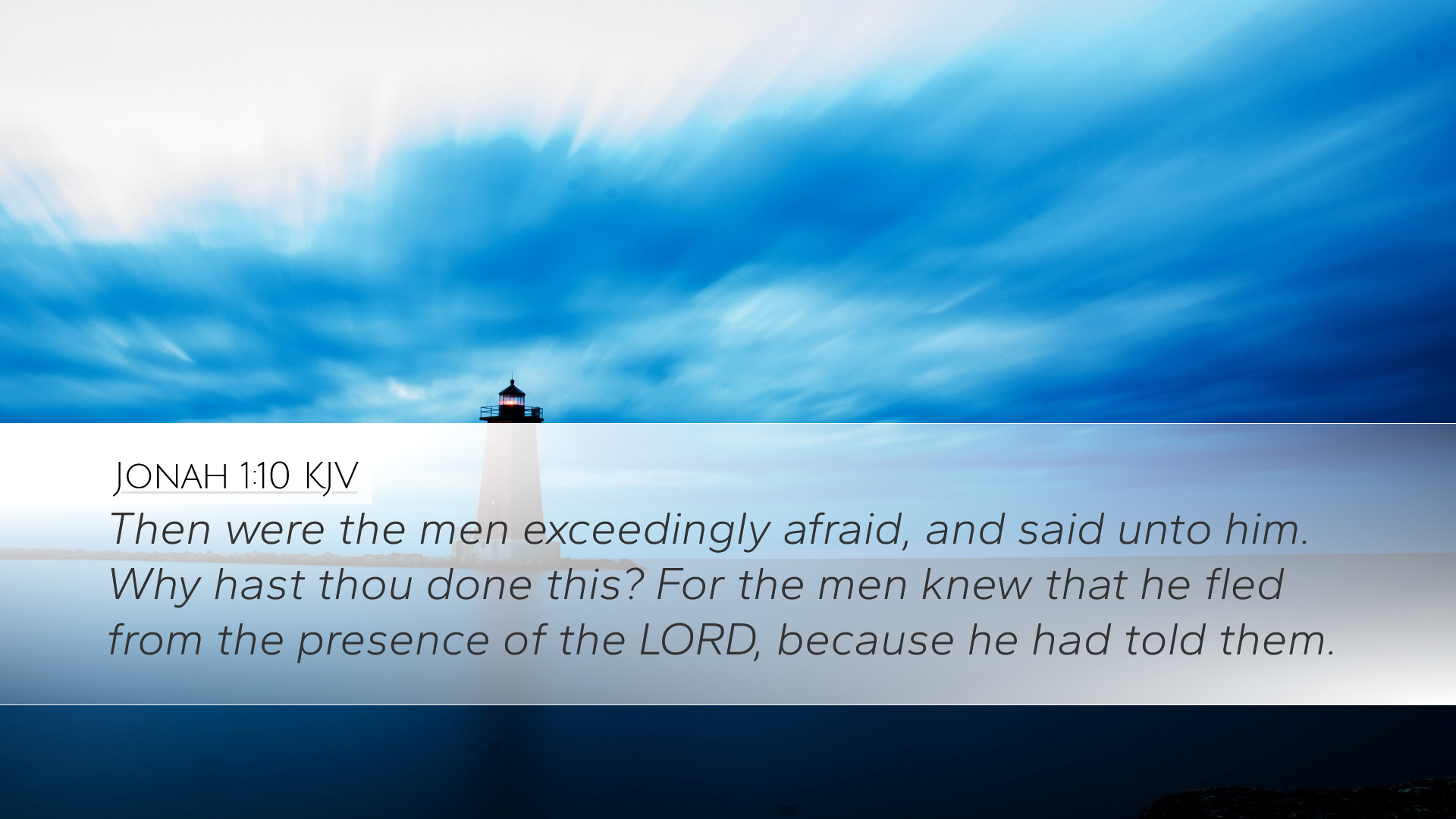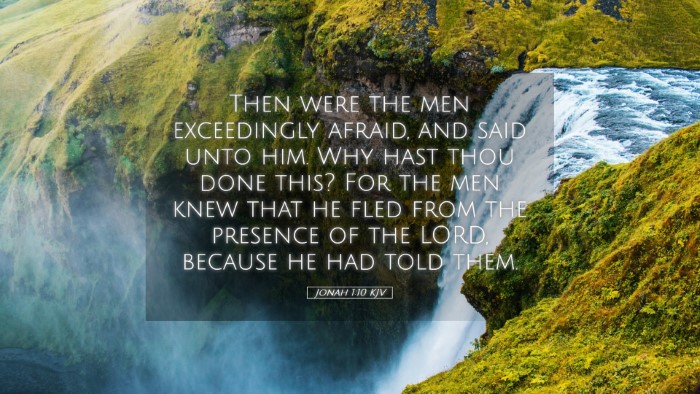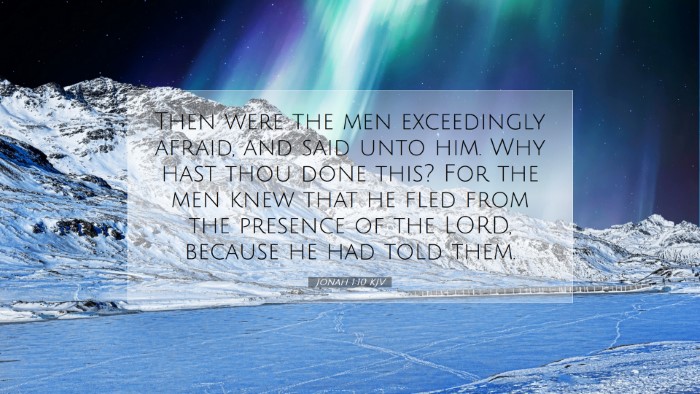Old Testament
Genesis Exodus Leviticus Numbers Deuteronomy Joshua Judges Ruth 1 Samuel 2 Samuel 1 Kings 2 Kings 1 Chronicles 2 Chronicles Ezra Nehemiah Esther Job Psalms Proverbs Ecclesiastes Song of Solomon Isaiah Jeremiah Lamentations Ezekiel Daniel Hosea Joel Amos Obadiah Jonah Micah Nahum Habakkuk Zephaniah Haggai Zechariah MalachiJonah 1:10
Jonah 1:10 KJV
Then were the men exceedingly afraid, and said unto him. Why hast thou done this? For the men knew that he fled from the presence of the LORD, because he had told them.
Jonah 1:10 Bible Commentary
Commentary on Jonah 1:10
Verse Reference: Jonah 1:10 - "Then were the men exceedingly afraid, and said unto him, Why hast thou done this? For the men knew that he fled from the presence of the Lord, because he had told them."
Introduction
The book of Jonah is a profound narrative that explores themes of obedience, divine mercy, and the human response to God’s calling. Jonah 1:10 captures a pivotal moment in which the truth about Jonah's actions ignites fear among the sailors, revealing both the spiritual dynamics at play and the nature of God’s intervention in human affairs.
Insights from Public Domain Commentaries
Matthew Henry
Matthew Henry emphasizes the reaction of the sailors as a critical indicator of their character and awareness. Their fear was not merely a response to a storm but was rooted in the understanding that they were aware of a divine displeasure. Henry notes:
- Exceedingly Afraid: The sailors’ reaction signifies the gravity of Jonah's situation. Their deep fear indicates an implicit recognition of God’s sovereignty over nature, reflecting the cultural understanding of the divine in the ancient Near East.
- Questioning Jonah: The sailors' inquiry, "Why hast thou done this?" illustrates their bewilderment. They engage Jonah, highlighting how his personal disobedience is impacting them collectively. This moment serves as a mirror for congregations today — to examine how individual disobedience can affect the community.
- Knowledge of Jonah's Flight: Their acknowledgement that Jonah was fleeing "from the presence of the Lord" underscores the universal understanding that one cannot escape God’s reach. Henry suggests this teaches us about the futility of trying to hide from God's calling in our lives.
Albert Barnes
Albert Barnes provides a theological exploration, noting that the sailors’ fear speaks to a broader reality about divine authority and human accountability. Barnes highlights:
- Cultural Understanding: The sailors’ worship of various gods reflects the polytheism of their culture. Their fear at revelation concerning Jonah sheds light on how even those outside Israel recognized the singular power of the true God.
- Consequence of Disobedience: Barnes argues that Jonah's actions not only endangered his own life but also the lives of those around him. This principle serves as a crucial teaching point for leaders and congregants: our choices often have ramifications beyond ourselves.
- Divine Sovereignty: He interprets this event as a demonstration of God's control over the elements, showcasing Him as the ultimate authority. For believers, this emphasizes the importance of aligning one's life with God’s purpose to avoid reckoning with the storms of life.
Adam Clarke
Adam Clarke provides a detailed examination of the text, adding historical and linguistic perspectives. His commentary enriches our understanding through several key points:
- Characterization of the Sailors: Clarke notes the sailors' reaction as evidence of their integrity. Despite being pagans, their fear indicates a moral discernment about the situation that plays into the broader narrative of God revealing himself to all nations.
- The Question of Avoidance: The sailors' shock at Jonah's confession leads Clarke to discuss the weight of accountability one bears when fleeing from divine responsibility. Jonah not only subjects himself to danger but implicates others in his disobedience.
- Theological Reflection: The verse serves as an invitation for readers to ponder their own walk with God. Clarke articulates that the acknowledgment of sin is the first step toward restoration, implying the need for the believer to confront their own flight from God.
Theological Implications
From the insights of these distinguished commentators, several theological principles emerge that are relevant for pastors, students, and scholars:
- God's Sovereignty: The narrative showcases that God remains in control, no matter how chaotic circumstances may appear. This reinforces the belief in providence and God's omnipotence.
- Accountability: Jonah's experience underscores the concept of individual responsibility. The shared consequences of his actions alert readers to the interconnectedness of human experience in faith communities.
- Divine Mercy: The fear of the sailors is met ultimately with God's mercy, providing a rich backdrop for understanding how God pursues His creation — even those who may seem far from Him.
Conclusion
Jonah 1:10 serves as a significant teaching point within the narrative of Jonah. It not only illustrates personal disobedience but serves as a lens through which we can examine our relationships with God and others. The combined wisdom from Matthew Henry, Albert Barnes, and Adam Clarke encourages a deep reflection on the nature of fear, accountability, and the reach of divine authority in our lives. Understanding Jonah’s journey prompts believers to embrace their calling and live in alignment with God’s will, recognizing that our choices impact the wider community.


